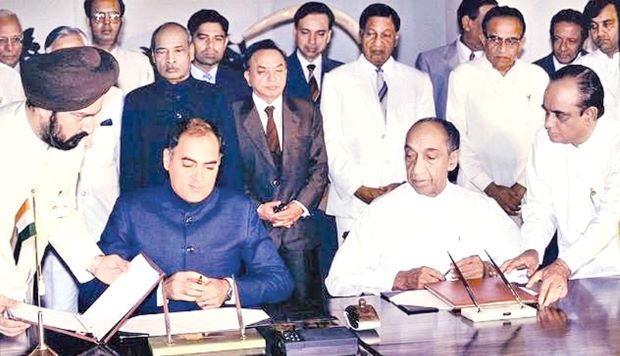The Indo-Sri Lanka Peace Accord, signed on this day in 1987 between Indian Prime Minister Rajiv Gandhi and Sri Lankan President J. R. Jayewardene, was expected to resolve the Sri Lankan Civil War by enabling the 13th Amendment to the Constitution of Sri Lanka and the Provincial Councils Act of 1987. Under the terms of the agreement, Colombo agreed to a devolution of power to the provinces, the Sri Lankan troops were to be withdrawn to their barracks in the North and the Tamil rebels were to surrender their arms.
Importantly however, the Tamil groups, notably the Liberation Tigers of Tamil Eelam (LTTE) (which at the time was one of the strongest Tamil forces), had not been made party to the talks and initially agreed to surrender their arms to the Indian Peace Keeping Force (IPKF) only reluctantly. Within a few months however, this flared into an active confrontation. The LTTE declared their intent to continue the armed struggle for an independent Tamil Eelam and refused to disarm. The IPKF found itself engaged in a bloody police action against the LTTE. Further complicating the return to peace, a Marxist insurgency began in the south of the island.
On the eve of the signing of the Indo-Sri Lanka Accord, Rajiv Gandhi was assaulted by Leading Rate Vijitha Rohana at the Guard of Honour held for Gandhi in what seemed an attempted assassination. Four years later, in 1991, Rajiv Gandhi was assassinated by a LTTE suicide bomber. This radically reduced support for the LTTE within India. In 2009, 19 years after his assassination, the Sri Lankan army mounted a major military offensive in the north and eradicated the LTTE. The operation was not opposed by India and received Indian diplomatic and military support, despite condemnations from state of Tamil Nadu and Western nations for alleged human rights violations. Rajiv Gandhi’s widow, Sonia Gandhi was the chairperson of India’s ruling coalition at the time.
-Wikipedia


